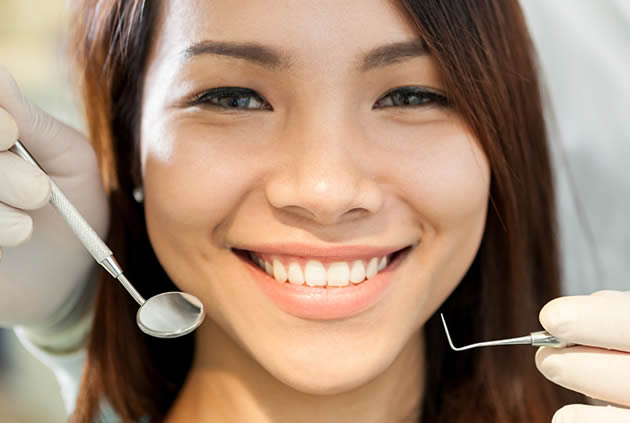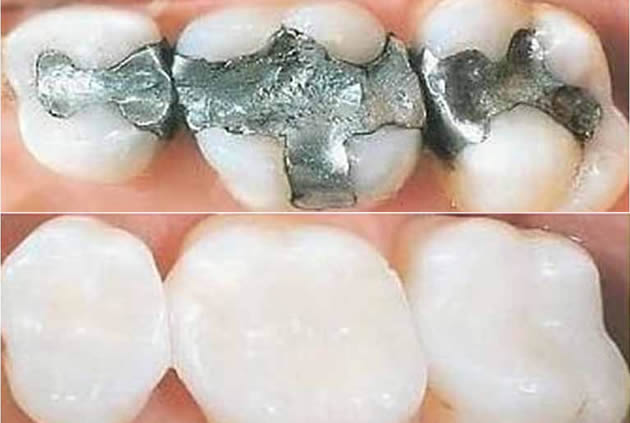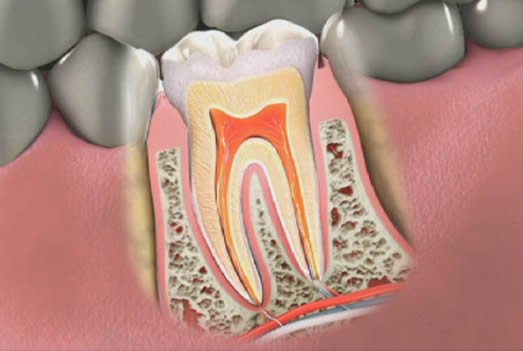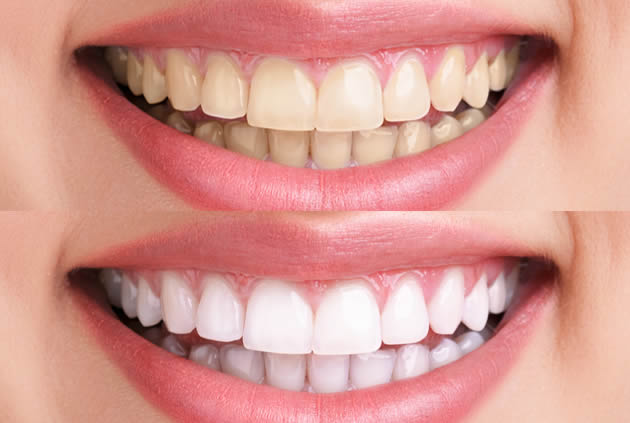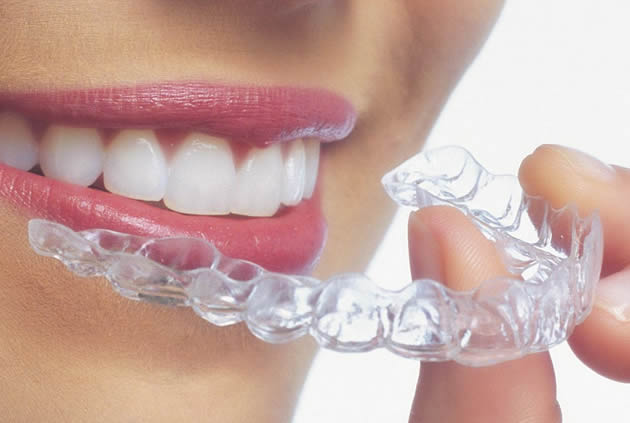
General Dentistry: A Comprehensive Overview
When we think of going to the dentist, it’s usually for a routine check-up, cleaning, or to have a pesky cavity filled. But what many people don’t realize is that these services fall under the umbrella of general dentistry, which encompasses a wide range of dental treatments and services.
What is General Dentistry?
In simple terms, general dentistry involves regular dental care aimed at preventing and treating common dental issues. This type of dentistry is focused on maintaining good oral health and keeping your teeth and gums healthy.
A general dentist is trained to provide various preventive, restorative, and cosmetic services that cater to the needs of patients of all ages. They help identify problems before they become major issues that could require more extensive treatment.
The Importance of Regular Dental Check-ups
Your oral health plays a significant role in your overall well-being. Neglecting your dental hygiene can lead to severe complications such as gum disease, tooth loss, heart disease, and even cancer.
Regular visits to a general dentist can help you prevent these problems from occurring by identifying any potential issues early. A typical dental check-up includes an examination of your teeth and gums for any signs of decay or inflammation.
Your dentist may also perform X-rays at regular intervals to track changes in the structure of your teeth or identify hidden issues such as impacted wisdom teeth. The earlier you catch any potential problems through routine check-ups, the easier they are to treat.
Plus you’ll save yourself time, money and pain by avoiding more extensive procedures later on. In our next section we will look more closely at what specific services fall under general dentistry so you can have an even better understanding about how it benefits you.
General Dentistry Services
When most people think of going to the dentist, they likely think of routine cleanings and exams. These are some of the most important services that general dentistry provides.
During a routine cleaning and exam, your dentist will check for any signs of tooth decay, gum disease, or other oral health issues. They will also clean your teeth to remove any tartar or plaque buildup.
X-rays and imaging are another essential part of general dentistry services. X-rays allow your dentist to see what’s going on beneath the surface of your teeth and gums.
This helps them identify any potential problems that may not be visible during a routine exam. Fillings and restorations are common general dentistry services that help repair damaged or decayed teeth.
If you have a cavity, your dentist will remove the decayed portion of your tooth and fill it with a dental filling material. In some cases, a tooth may be beyond repair with fillings and restorations, leading to the need for extraction.
Tooth extractions can be performed in-office by a skilled dentist with minimal pain and discomfort. Root canal therapy is another treatment option for severely damaged or infected teeth.
During this treatment, the dentist removes infected nerve tissue from within the tooth’s roots before filling it with a special dental material to prevent future infection. Overall, these general dentistry services serve as preventive measures against oral health issues while providing solutions for existing conditions when needed.
Preventative Care
Fluoride Treatments: Protecting your Teeth from Decay
When it comes to caring for your teeth, prevention is key. And one of the most effective preventative measures you can take is getting regular fluoride treatments.
Fluoride is a natural mineral that helps to strengthen your tooth enamel, making it more resistant to decay. Fluoride treatments are quick and painless, and can be done in just a few minutes during your regular dental cleaning.
Sealants: Preventing Cavities before they Start
Another important preventative measure you can take is getting dental sealants. Sealants are a thin coating that is applied to the surface of your teeth, covering the deep grooves and pits where bacteria like to hide. This helps prevent cavities from forming in those hard-to-reach areas, making it easier for you to maintain good oral health.
Oral Cancer Screenings: Early Detection Saves Lives
Oral cancer may not be something you think about often, but it’s important to get screened regularly. With early detection, oral cancer can be treated successfully in many cases.
During an oral cancer screening, your dentist will examine your mouth for any signs of abnormal growths or other issues. It’s a quick and painless process that could potentially save your life.
Gum Disease Treatment: Keeping Your Gums Healthy
Gum disease is a common problem that affects many people at some point in their lives. It occurs when plaque builds up on the teeth and gums, causing inflammation and eventually leading to infection if left untreated. Fortunately, gum disease can usually be treated with a simple procedure called scaling and root planing.
During this treatment, your dentist will clean beneath the gum line to remove any built-up plaque or tartar and smooth out the roots of your teeth to help prevent further buildup. If you have gum disease, it’s important to get it treated as soon as possible to prevent more serious complications down the road.
Cosmetic Dentistry Options
Teeth Whitening: Brighten Your Smile
Are you tired of feeling self-conscious about your stained or yellowed teeth? Teeth whitening is a popular cosmetic dentistry option that can help restore your confidence. There are many methods available, including in-office treatments, take-home trays, and even over-the-counter products.
Most whitening options use a bleaching agent to break up stains and discoloration on the enamel surface of your teeth, leaving you with a brighter smile. Keep in mind that while teeth whitening is safe for most people, it’s important to consult with your dentist first to ensure that you’re an ideal candidate for this procedure.
Veneers: The Ultimate Smile Makeover
Veneers are thin, custom-made shells that cover the front surface of your teeth to improve their appearance. They can be used to correct a variety of imperfections such as chips, cracks, stains or misaligned teeth. Veneers are made from either porcelain or composite resin material and are bonded permanently to the front of your teeth.
This means you can enjoy long-lasting results with little maintenance required! If you’re looking for a dramatic smile transformation without invasive procedures like braces or surgery, veneers might be right for you.
Invisalign: Straighten Your Teeth Discreetly
Invisalign aligners are an increasingly popular alternative to traditional metal braces. These clear plastic trays gradually shift your teeth into the desired position over time without any discomfort associated with traditional braces. One of the biggest advantages of Invisalign aligners is that they’re virtually invisible – meaning no one will know that you’re undergoing orthodontic treatment!
Plus, they offer added convenience because they can be removed during meals and dental hygiene routines (like brushing and flossing). However, it’s important to note that Invisalign may not be right for everyone, and it’s essential to consult with your dentist to determine the best orthodontic treatment plan for your needs.
Specialized Dental Services
While general dentists provide a range of services, there are some dental needs that require specialized attention. Two of these areas are pediatric dentistry and geriatric dentistry.
Pediatric Dentistry
Pediatric dentists specialize in providing dental care to children until they reach adulthood. Children have unique dental needs, and their teeth and mouths change rapidly as they grow. Therefore, it is important for children to receive specialized care from a dentist who is trained to work with them.
Some of the services provided by pediatric dentists include preventive care like cleanings and fluoride treatments, as well as treatment for cavities and other common issues. Pediatric dentists also focus on education – teaching children how to take care of their teeth through brushing, flossing, and other healthy habits.
Geriatric Dentistry
Geriatric dentists specialize in treating older adults – typically those over the age of 65. As people age, they often face a range of dental issues that require specialized attention. Some common issues include gum disease, dry mouth (which can be caused by medications or certain medical conditions), tooth loss or decay due to years of wear-and-tear on the teeth, and even oral cancer.
Geriatric dentists provide preventive care like cleanings and exams but also may offer more targeted treatments for specific conditions. In addition to treating specific dental issues, geriatric dentists may also work with other healthcare providers to ensure that their patients receive comprehensive care that meets all their health needs as they age.
Emergency Dental Care
Emergencies can happen at any time, including dental emergencies. A dental emergency is a serious issue that requires immediate attention from a dentist to save a tooth or prevent further damage to the mouth. It is important to know what constitutes a dental emergency, so you can act quickly and prevent further damage.
Common dental emergencies
A knocked-out tooth, severe toothache, broken or chipped teeth are all examples of common dental emergencies. A knocked-out tooth can usually be saved if you act quickly by placing the tooth back in its socket or keeping it in your mouth until you see a dentist. A severe toothache could signal an infection that requires immediate attention to prevent it from spreading.
A broken or chipped tooth can be painful and also affect your appearance. If left untreated, it could lead to decay and further problems down the line.
What to do in case of a dental emergency
The first step when faced with a dental emergency is not to panic. Stay calm and assess the situation before taking action. In case of a knocked-out tooth, rinse it with water and place it back into its socket if possible.
If that is not possible, keep the tooth moist by placing it in your mouth or in milk until you reach the dentist’s office. For severe pain, rinse your mouth with warm salt water and take over-the-counter pain relievers like ibuprofen.
It’s important to get help immediately for any kind of dental emergency because quick action can make all the difference between saving or losing a damaged or infected teeth. Call your dentist right away for advice on what steps should be taken next depending on specific urgent problem being faced at that moment.
Knowing what constitutes as an emergency situation when it comes to dentistry will help you make better decisions about how best deal with such situations as they arise. Keep your dentist’s contact information handy so you can get in touch with them quickly in case of an emergency.
Schedule an Appointment
Overall, general dentistry services are critical for maintaining good oral health. By regularly visiting a dentist for routine cleanings and exams, you can prevent more serious dental issues down the line.
Additionally, preventative care measures such as fluoride treatments, sealants, and oral cancer screenings can help catch any potential problems early on. Beyond just preventing dental issues, general dentistry also offers cosmetic options such as teeth whitening, veneers, and Invisalign.
These services can improve the appearance of your teeth and boost your confidence. It’s important to note that specialized dental services such as pediatric and geriatric dentistry are also available to cater to specific age groups’ needs.
In case of a dental emergency, it’s essential to know what steps to take and where to go for help. Quick action can save your tooth or relieve pain.
Don’t wait until you experience a problem with your teeth or gums before seeking out general dentistry services. Regular check-ups and preventative care measures are key to maintaining excellent oral health throughout your life.
Do you live in Baltimore or the surrounding area? Our team is ready to help you achieve your smile goals. Schedule your appointment today.
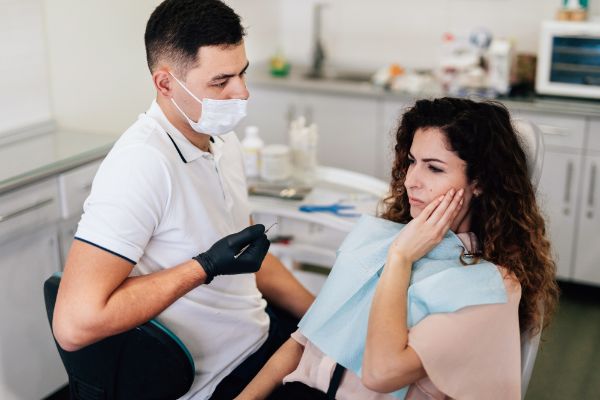
Understanding the Link Between Stress and Teeth Grinding
Stress, in simple terms, is a response to any stimuli that requires us to adjust or adapt. This can be anything from a demanding job to a difficult relationship.
The body’s response to stress involves the release of hormones like adrenaline and cortisol, which helps us stay alert and focused in challenging situations. However, chronic stress can have a negative impact on our physical and mental health.
One of the common physical manifestations of stress is teeth grinding or bruxism. The involuntary clenching or grinding of teeth can occur during sleep or while awake.
While occasional teeth grinding is not harmful, persistent bruxism can cause dental problems like worn-down teeth and jaw pain. In this article, we will explore the link between stress and teeth grinding in detail.
We will examine the causes, symptoms, treatment options for bruxism as well as practical tips for reducing daily stress levels. By understanding how stress affects our oral health, we can take steps to protect our smiles and overall well-being.
What is teeth grinding(also known as bruxism)?
Have you ever experienced clenching or grinding your teeth? This habit is called bruxism, and it is one of the most common dental problems that people encounter. Teeth grinding can occur during sleep or while awake, and it affects both adults and children.
Bruxism is a condition where a person unconsciously grinds their teeth or clenches their jaw. It can happen at any time of the day, but it’s most common during sleep. It can be mild or severe, and some people don’t even know they’re doing it until they experience symptoms such as headache, jaw pain, and tooth sensitivity.
Teeth grinding during sleep or while awake
Teeth grinding when you’re asleep is known as sleep bruxism. The exact cause of this type of bruxism is unclear, but medical experts suggest that stress and anxiety are some of its contributing factors. On the other hand, awake bruxism occurs when you clench your jaw or grind your teeth while being conscious.
Unlike sleep bruxism which may be caused by unconscious habits related to stress, awake bruxism may be caused by an aligned bite-occlusion issue wherein the upper and lower jaws do not meet correctly with each other. Both types may result in similar symptoms such as headaches in the morning, soreness in the jaw muscles upon waking up or throughout the day & worn down teeth over time due to wear-and-tear on the enamel from constant rubbing between opposing rows of teeth for extended periods – although these symptoms tend to be more pronounced in night-time grinders since they are unaware they are doing so at all!
Causes of teeth grinding
Teeth grinding, also known as bruxism, can occur for various reasons. However, stress is considered the primary cause of this condition.
When people experience high levels of stress or anxiety, it can manifest itself in different ways throughout the body. Teeth grinding is one of the ways our bodies cope with stress.
In addition to stress, other factors may contribute to bruxism. People with anxiety disorders are more likely to grind their teeth than those without them.
Sleep disorders such as sleep apnea and obstructive sleep apnea have also been linked to bruxism. Certain medications like antidepressants and antipsychotics that affect serotonin levels in the brain can increase the risk of teeth grinding.
It’s important to understand that these factors do not necessarily cause bruxism on their own but rather increase its likelihood when someone experiences high levels of stress or anxiety. Understanding the causes of your teeth grinding can help you identify triggers and take steps to manage it before it becomes a chronic problem that affects your overall health and well-being.
Stress as a primary cause of teeth grinding
Stress is by far the most common trigger for teeth grinding. The human body has evolved over millions of years to respond quickly and efficiently to perceived threats such as predators or natural disasters by preparing us for fight-or-flight response through an increase in adrenaline and cortisol hormone levels.
Even if we don’t have immediate physical danger present around us, our bodies often interpret everyday events like job pressure or relationship problems as threats resulting in chronically elevated cortisol levels which eventually take a toll on our general health. One way our bodies release this excess energy is through clenching and then subsequently grinding our teeth together while we sleep or during times when we’re feeling especially tense.
Other factors
While stress is considered the primary cause of teeth grinding, several other factors can contribute to this condition. People with anxiety disorders may grind their teeth more frequently than those without these conditions.
Sleep disorders such as sleep apnea and obstructive sleep apnea have also been linked to bruxism. Additionally, certain medications like antidepressants and antipsychotics can increase the risk of teeth grinding by altering serotonin levels in the brain.
It’s worth noting that not everyone who experiences these factors will develop bruxism, but they may increase the likelihood of it occurring in people who are already susceptible. By understanding these additional contributing factors, individuals can better understand their own risk for developing bruxism and seek help early if necessary.
Symptoms of teeth grinding
Some common signs that you may be grinding your teeth, including jaw pain, headaches, and worn-down teeth. Jaw pain is one of the most common symptoms of bruxism.
You may experience a dull ache or sharp pain in your jaw muscles when you wake up in the morning or throughout the day. This pain can also radiate to other areas such as your ears and temples.
Headaches are also a frequent symptom of teeth grinding. The pressure and tension caused by clenching your jaw muscles during sleep can lead to headaches that range from mild to severe.
If you notice that you wake up with a headache or experience them more frequently than usual, it might be time to investigate whether bruxism is the culprit. Worn-down teeth are another sign of bruxism.
Over time, constant clenching and grinding can cause damage to your enamel and lead to chipped or broken teeth. This type of damage can not only be unsightly but also negatively impact overall health by making it difficult for you to chew food properly.
It’s important to recognize these symptoms early on in order to prevent further damage and seek professional help if necessary. Don’t let stress take control over your oral health- take action today!
Treatment options for teeth grinding
Mouth guards
One of the most common treatment options for teeth grinding is a mouth guard, which can be worn while sleeping to protect the teeth from further damage. There are different types of mouth guards available, including custom-made ones that are specifically designed to fit your mouth and over-the-counter options that can be purchased at a pharmacy. While mouth guards may not necessarily stop the teeth grinding altogether, they can alleviate some of the symptoms associated with bruxism.
Stress management techniques
Since stress is often a key contributor to teeth grinding, stress management techniques can also be beneficial in treating bruxism. This includes regular exercise, learning relaxation techniques like yoga or meditation, and seeking counseling or therapy to address underlying emotional issues that may be causing stress.
Medication in severe cases
In severe cases of bruxism where neither a mouth guard nor stress management techniques provide relief, medication may be prescribed. Muscle relaxants and anti-anxiety medication are commonly used to decrease muscle activity and relieve tension in the jaw muscles. However, it’s important to note that medication should only be used under the guidance of a healthcare professional.
Seeking professional help for persistent bruxism
It’s important to seek professional help if you have persistent bruxism as it can lead to long-term damage if left untreated. A dentist or doctor can evaluate your symptoms and recommend an appropriate course of treatment based on the severity of your condition.
Ignoring symptoms such as constant headaches or jaw pain could lead to serious health problems such as temporomandibular joint (TMJ) disorder or even tooth loss in severe cases. In addition, seeking professional help will ensure that you receive proper guidance on managing stress levels which will also greatly benefit overall health and wellbeing.
Remember that the longer you wait to address bruxism, the more difficult it may be to treat. So, if you suspect that you are grinding your teeth, don’t hesitate to seek help from a professional.
Prevention tips for reducing stress-related teeth grinding
Offer practical tips for reducing daily stress levels such as exercise or meditation
One of the most effective ways to prevent teeth grinding is by reducing daily stress levels. Stress can come from a variety of sources, including work, relationships, and finances.
By implementing regular activities that promote relaxation and calmness, you can reduce your overall stress level. One great way to do this is through exercise.
Exercise releases endorphins in the brain which improve your mood and reduce feelings of anxiety. Even a short walk around the block during your lunch break can make a big difference in how you feel throughout the day.
Another great way to reduce stress levels is through meditation. Meditation has been shown to have numerous benefits for both mental and physical health, including reduced anxiety and lower blood pressure.
If you’re new to meditation, there are many resources available online that can help you get started. Try setting aside 10-15 minutes each day for a guided meditation or simply sit quietly and focus on your breath.
The Link Between Stress and Teeth-Grinding
Recognizing the link between stress and teeth-grinding is crucial for both dental health and overall wellbeing. Stress can cause a host of physical and emotional symptoms, including bruxism.
If left untreated, teeth-grinding can lead to tooth damage, jaw pain, headaches, and other issues that can negatively impact daily life. It’s important to seek professional help if you suspect that you are grinding your teeth due to stress or any other factors.
A dentist can help identify the underlying causes of bruxism and recommend appropriate treatment options such as a mouthguard or relaxation techniques. Reducing daily stress levels through exercise, meditation, or other relaxation techniques before bed may also be helpful in preventing teeth-grinding related to stress.
Remember that with proper care and attention, teeth-grinding related to stress is treatable. By recognizing the link between stress and bruxism early on, taking steps to manage stress levels, seeking professional help when necessary – we can improve our dental health as well as our overall wellbeing.
Take the first step towards a confident smile. Contact our Baltimore dental office to schedule your consultation!
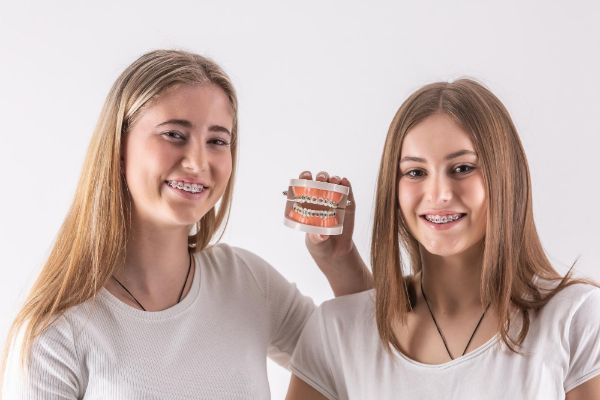
For many people, having straight teeth is a goal they hope to achieve.
For many people, having straight teeth is a goal they hope to achieve. Not only do straight teeth improve one’s appearance, but they also contribute to better oral health.
Orthodontic treatment is the process of aligning teeth using various orthodontic devices such as braces or Invisalign. While orthodontic treatment can be costly and time-consuming, the benefits of having straighter teeth are worth the effort.
Invisalign and Braces
Braces consist of metal brackets affixed to each tooth that are connected by wires. They exert pressure on the teeth to move them into proper alignment gradually. On the other hand, Invisalign consists of clear plastic aligners worn over your teeth that gradually push them into position over time.
While both Invisalign and braces are effective in straightening teeth, they have significant differences that make one a better option for certain individuals. Factors such as cost, personal preference, severity of malocclusion, compliance with treatment plan should all be considered when choosing between these two treatments for straightening your smile.
Choosing between braces or Invisalign will depend upon various factors like personal preference regarding appearance & maintenance requirements; severity level related to orthodontic issues being addressed; cost considerations; convenience factor with either option etc. Ultimately it’s the orthodontist that will determine which treatment plan is best suited to meet your needs based on various factors specific to you.
Invisalign: A Clear Alternative
Invisalign Treatment Process
Invisalign is an orthodontic treatment that uses a series of clear, removable aligners to straighten teeth. The process begins with a consultation with an orthodontist who will evaluate the patient’s teeth and determine if Invisalign is a viable option.
If so, digital images and impressions of the patient’s teeth are taken to create a 3D model which will serve as the basis for designing the custom aligners. Once the aligners are ready, they are worn for approximately two weeks before being replaced by a new set.
This process continues until the desired tooth movement is achieved. The length of treatment varies depending on individual cases.
Advantages of Invisalign
Invisible Appearance
One of the most significant advantages of Invisalign is its nearly invisible appearance. The clear plastic aligners blend with the natural color of teeth, making them an excellent choice for those who want to straighten their teeth without attracting attention.
Removable Aligners
Another advantage is that Invisalign aligners are removable. This feature allows patients to eat, brush, and floss as usual without hindrance from wires or brackets. It also makes it easier to clean aligners and maintain good oral hygiene.
No Food Restrictions
Unlike traditional braces which require careful consideration when it comes to food choices, there are no restrictions on what you can eat while undergoing Invisalign treatment since they can be removed during meals.
Disadvantages of Invisalign
Limited Effectiveness for Complex Cases
While effective for many mild to moderate cases, complex orthodontic issues such as severe overcrowding or bite problems may require traditional braces for the best results. Orthodontists will evaluate each patient’s unique needs to determine if Invisalign is a suitable option.
Requires Discipline to Wear Aligners Consistently
Invisalign aligners must be worn for at least 22 hours per day, which requires discipline and dedication. Patients must be committed to wearing the aligners as prescribed to ensure the treatment progresses correctly and achieves the desired results within an optimal timeframe. Failure to do so may prolong treatment or result in unsatisfactory outcomes.
Braces
Braces treatment process
Braces are a popular orthodontic option that involves attaching brackets to the teeth and connecting them with archwires. Over time, the wires are adjusted to move the teeth into the proper position. The process typically takes anywhere from one to three years, depending on the complexity of the case.
Advantages of Braces:
Effective for complex cases
While Invisalign is effective for many mild to moderate cases, braces are often a better option for more complex orthodontic issues. For example, severely crooked teeth or significant bite problems may require the use of traditional braces. Braces also allow for greater control over tooth movement and can address more severe overcrowding than Invisalign.
Can be less expensive than Invisalign
One significant advantage of traditional braces is their lower cost compared to Invisalign. The average cost of braces ranges from $3,000-$7,000 while Invisalign can cost $4,000-$8,000 or more. This makes braces a more accessible option for many individuals and families.
Disadvantages of Braces:
Food restrictions
One major disadvantage of traditional braces is that patients must avoid certain foods that can damage or dislodge brackets and wires. Sticky candies like taffy and bubblegum should be avoided as well as hard foods like popcorn kernels and ice cubes because they can bend wires or break brackets.
Disadvantages of Braces: Visible appearance
Another disadvantage is their visible appearance. While some patients embrace their new look with stylish rubber band colors or designs on their brackets others may feel self-conscious about having metal in their mouth during treatment especially adults in professional settings making this treatment less desirable for them.
Comparison between Invisalign and Braces
When it comes to choosing between Invisalign and braces, there are some important factors to consider. The comparison can be made in terms of cost, effectiveness, and convenience.
Cost comparison between the two treatments
One of the biggest factors that people consider when deciding between Invisalign and braces is the cost. Generally speaking, Invisalign is more expensive than traditional braces.
This is because Invisalign requires custom-made aligners that are designed specifically for each patient. Additionally, since Invisalign is a newer technology than traditional braces, it comes with a higher price tag.
However, it’s worth noting that many dental insurance plans will cover both types of treatment up to a certain amount. Patients should consult their insurance provider to see what their policy covers.
Effectiveness comparison based on the complexity of the case
When it comes to effectiveness in treating orthodontic issues, both Invisalign and braces can be highly effective tools depending on the complexity of each individual case. In general, traditional braces tend to be more effective for complex cases such as severe overcrowding or significant bite issues.
Braces use wires and brackets that apply constant pressure on teeth which allows for more precise control over tooth movement. On the other hand, if your orthodontic issues are less complex or bite-related (such as minor spacing or crowding), then clear aligners like Invisalign may be an excellent choice.
Convenience comparison based on maintenance requirements
Maintenance requirements are another factor to consider when comparing Invisalign and braces. Both treatments require regular visits with an orthodontist for adjustments but there are some notable differences in convenience: With traditional metal braces food restrictions need to be adhered too since certain foods can damage brackets or get stuck in wires which can prolong the treatment process.
In contrast, Invisalign allows for removal of aligners before eating, so there are no food restrictions with Invisalign. Another advantage of Invisalign is that it doesn’t require as much maintenance as metal braces.
Patients wearing braces need to brush and floss around the brackets which can be difficult to reach and clean. On the other hand, Invisalign aligners can be easily removed and cleaned with a toothbrush and cleaning solution.
Overall, when deciding between Invisalign versus braces, you should think about your specific situation and preferences. Factors such as cost, effectiveness, convenience, and aesthetics should all be weighed to make an informed decision about which treatment option is best for you.
Choosing between Invisalign and braces
Choosing requires careful consideration of individual factors such as the complexity of the case, personal preferences, and lifestyle. Invisalign provides a discreet alternative with removable aligners that allow for more flexibility in terms of eating and oral hygiene.
On the other hand, braces are more effective for complex cases requiring significant corrections and are generally less expensive. It is essential to consult with an orthodontist to determine which treatment option is best suited for your specific dental needs.
Researching patient reviews and studying before-and-after photos can also provide valuable insights into each option’s effectiveness in achieving desired results. Ultimately, both Invisalign and braces can provide excellent results in straightening teeth and improving oral health.
The final decision should be based on an individual’s unique circumstances, lifestyle, and budget. With ongoing advancements in orthodontic technology, patients have access to a range of options that can help them achieve their ideal smile.
Take the first step towards optimal oral hygiene. Reserve your dental appointment at our Baltimore dental office now and experience personalized care.
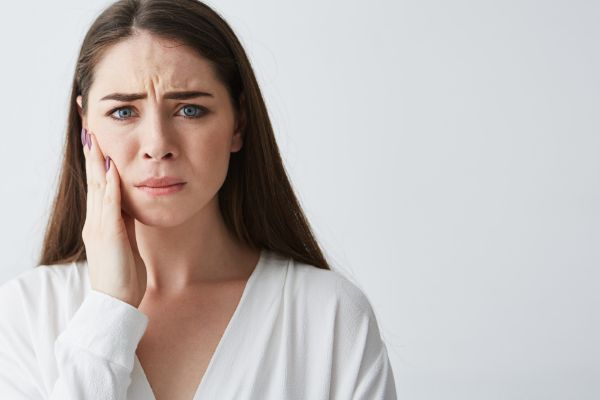
Oral Cancer
Oral cancer is a relatively uncommon, but potentially life-threatening disease that affects various parts of the mouth, including the lips, tongue, gums, palate, and throat. While its incidence rate is lower compared to other types of cancers such as breast or lung cancer, early detection remains crucial in improving the prognosis and increasing the chances of successful treatment. In this article, we will discuss in detail the definition of oral cancer and why it’s important to be aware of its symptoms.
Definition of Oral Cancer
Oral cancer refers to any malignant cell growth that occurs within or around the oral cavity. In most cases, it starts with abnormal cells that multiply uncontrollably and eventually form a tumor.
This type of cancer can form on different areas inside the mouth like gums, tongue or lips or even on salivary glands and tonsils. There are several types of oral cancers including squamous cell carcinoma which is one of themost common type accounting for more than 90% cases.
Importance of Early Detection
Early detection is critical when it comes to battling oral cancer because it can significantly increase chances for successful treatment. Unfortunately many people do not realize they have oral issues until it becomes too late as symptoms may not appear until later stages which makes treatment more difficult. But by being aware an individual can be able to identify some signs early enough before they advance into a serious condition.Thus regular dental check-ups are also important for early diagnosis where dentist checks inside your mouth for any abnormalities.
Statistics on Oral Cancer Cases
According to American Cancer Society estimates in 2021 almost 54,000 individuals will be diagnosed with oral cavity or oropharyngeal cancers in US alone . It is estimated that there will be approximately 10,850 deaths from these cancers.In fact despite advances in medical treatments over the past few decades, the death rate for oral cancer has remained relatively high due to late diagnosis. This underscores the importance of being vigilant about detecting and treating oral cancer as early as possible.
Risk Factors for Oral Cancer
Tobacco Use (Smoking and Chewing)
Tobacco use is one of the primary risk factors for oral cancer. This includes both smoking and chewing tobacco.
Smoking cigarettes, cigars or pipes exposes the mouth to harmful chemicals that can damage the cells in the mouth, leading to cancer over time. Smokeless tobacco, such as chewing tobacco or snuff, is also dangerous because it contains carcinogenic chemicals that are absorbed through the lining of the mouth and can contribute to cancer development.
Alcohol Consumption
Heavy alcohol consumption is another major risk factor for oral cancer. When combined with tobacco use, alcohol consumption greatly increases a person’s risk of developing oral cancer. Alcohol weakens the cells in the mouth and makes them more susceptible to damage from other carcinogens.
HPV Infection
The human papillomavirus (HPV) is a sexually transmitted infection that has been linked to an increased risk of oral cancer. HPV-related oral cancers tend to occur in younger patients who do not have a history of tobacco or alcohol use. It’s important for people to remember that HPV-related cancers are not exclusively caused by sexual activity but also could be caused by just sharing utensils like forks etc.
Sun Exposure
Prolonged exposure to sunlight can increase a person’s risk of lip cancer – a type of oral cancer that affects the lips specifically. This is because excessive exposure causes damage to lip cells which can lead to DNA damage overtime resulting in an increased potential for developing malignant tumors on lips especially lower lip due its greater exposure compared with upper lip.. It’s recommended that individuals limit their sun exposure and apply SPF-containing lip balm when out in direct sunlight for prolonged periods..
Symptoms of Oral Cancer
Oral cancer is a deadly disease that can manifest itself in several ways. The signs and symptoms of oral cancer can be difficult to identify, especially in the early stages when the symptoms are often subtle or absent. However, it is important to be mindful of any changes in your mouth or throat and seek medical attention if you notice any unusual growths or lesions.
Sores or ulcers that do not heal within 2-3 weeks
One of the most common symptoms of oral cancer is a sore or ulcer that does not heal within 2-3 weeks. These sores may be painless at first but gradually become painful over time. Sores can occur anywhere in the mouth including on the tongue, lips, gums, and roof of the mouth.
Red or white patches in the mouth
Another symptom to look out for is red or white patches inside the mouth. These patches may appear as flat lesions on the tongue, cheeks, gums, or other areas inside the mouth. They may also appear as raised bumps or thickened areas.
Difficulty swallowing or speaking
Difficulty swallowing (dysphagia) can also be an early sign of oral cancer. This occurs when there is a sense of food getting stuck in your throat while eating. Similarly, difficulty with speech (dysarthria) can also occur due to changes in muscle control and sensation around your tongue.
Chronic sore throat or hoarseness
A chronic sore throat and hoarseness could indicate a problem with your vocal cords which could be caused by cancerous growths inside your throat. A persistent cough accompanied by bloodstained mucus should definitely prompt urgent medical attention from qualified professionals.
It is important to keep track of any changes in your oral health and seek immediate medical attention if there are any unusual symptoms or growths. Early detection is key to successful treatment of oral cancer.
Diagnosis and Treatment of Oral Cancer
Oral examination by a dentist or doctor
The first step in the diagnosis of oral cancer is a thorough oral examination by a dentist or doctor. During this exam, the healthcare professional will look for any anomalies in the mouth, including lumps, bumps, ulcers, or discolored patches.
They may also examine the head and neck areas to check for any swollen lymph nodes. This process is vital because it can help detect early signs of oral cancer before they progress to more advanced stages.
Biopsy to confirm diagnosis
If anything suspicious is found during the oral examination, a biopsy may be recommended to confirm the diagnosis of oral cancer. A biopsy involves removing a small piece of tissue from the affected area and examining it under a microscope to identify any abnormal cells. This procedure is usually performed under local anesthesia and can be done in an outpatient setting.
Treatment options including surgery, radiation therapy and chemotherapy
Treatment options for oral cancer depend on various factors such as stage and location of cancer, patient’s overall health status etc. Surgery is often recommended as an initial treatment option especially if it’s located in one specific area which can be easily removed without damaging any other structures nearby. Radiation therapy uses high-energy radiation beams to kill cancer cells while chemotherapy uses drugs that target fast-growing cells throughout your body including cancer cells though it has several side effects like hair loss, nausea etc.
In certain cases, combination therapies that incorporate surgery with radiation therapy or chemotherapy are used to improve outcomes for patients with more advanced forms of oral cancer. It’s important to consult with an experienced surgeon and oncologist who specializes in treating this type of cancer so they can provide individualized recommendations based on various factors like health status, location/stage etc., tailored specifically for each patient’s unique care plan needs.
Prevention Strategies for Oral Cancer
Avoiding Tobacco Products and Alcohol Consumption
Smoking and chewing tobacco products are some of the leading causes of oral cancer. The chemicals found in tobacco can damage the cells in the mouth, making it more susceptible to cancerous growth.
Alcohol consumption can also increase the risk of oral cancer, particularly when combined with smoking or chewing tobacco. Therefore, limiting or avoiding these substances altogether can significantly reduce one’s risk of developing oral cancer.
Practicing Good Oral Hygiene Habits
Maintaining healthy oral hygiene practices is an essential part of preventing oral cancer. Brushing teeth at least twice a day and flossing daily help remove harmful bacteria that may cause damage to the cells in the mouth. Using alcohol-free mouthwash that contains fluoride after brushing and flossing helps kill harmful bacteria that may have been missed by brushing.
Getting Vaccinated against HPV Infection
Human papillomavirus (HPV) is a sexually transmitted virus that has been linked to an increased risk of developing oral cancer, particularly in younger individuals. The HPV vaccine is one available measure for preventing this type of infection. It is recommended to get vaccinated against HPV between ages 9-14 but can be given up until age 26.
Incorporating these preventive measures into one’s lifestyle can help minimize their risk of developing oral cancer significantly. Avoiding tobacco products and alcohol consumption, practicing good dental hygiene habits such as brushing and flossing daily, using alcohol-free mouthwash with fluoride and getting vaccinated against HPV are all ways you can protect yourself from this deadly disease.
The Role of Dentists in Early Detection of Oral Cancer
Regular dental check-ups are crucial in the prevention and early detection of oral cancer. Dentists have a vital role in identifying any unusual changes in the mouth, including signs of oral cancer.
During a regular dental exam, dentists will perform an oral examination to detect any abnormalities like sores or ulcers that do not heal for two to three weeks, red or white patches inside the mouth, difficulty swallowing or speaking, chronic sore throat or hoarseness. Early detection of these symptoms can lead to immediate treatment and improve the chances of successful recovery.
Regular Dental Check-Ups as a Preventive Measure
Going for regular dental check-ups is not only good for preventive care but also an excellent way to detect early signs of oral cancer. People who visit their dentist regularly have better chances of preventing many diseases, including oral cancer. By doing routine check-ups at least twice a year, people can identify potential concerns that may require further investigation and treatment.
Dentist’s Role in Identifying Early Signs of Oral Cancer
Dentists play a key role in identifying early signs of oral cancer before they become visible symptoms. They use various diagnostic tools such as visual exams, tissue biopsies, and imaging tests like X-rays and CT scans to identify suspicious changes in the mouth’s tissues that could indicate malignant growths. If there is any evidence suggesting cancerous growths present during an examination, dentists will refer patients to specialists who can do additional testing to confirm diagnosis.
Oral cancer is a serious condition that can be deadly if not detected and treated early.
Through understanding the risk factors, symptoms, and preventive strategies, you can take steps to protect yourself from oral cancer.
Always keep an eye out for any unusual changes in your mouth and seek professional help if you notice anything suspicious. Remember that early detection is key to successful treatment.
- Oral cancer is a type of cancer that affects the mouth, tongue, lips or throat.
- Risk factors include tobacco use (smoking and chewing), alcohol consumption, HPV infection, and sun exposure.
- Symptoms of oral cancer include sores or ulcers that do not heal within 2-3 weeks, red or white patches in the mouth, difficulty swallowing or speaking.
- Diagnosis is made through an oral examination by a dentist or doctor followed by biopsy to confirm diagnosis.The main treatment options are surgery, radiation therapy and chemotherapy.
- The most effective prevention strategies are avoiding tobacco products and alcohol consumption as well as practicing good oral hygiene habits. Getting vaccinated against HPV infection can also reduce your risk of developing oral cancer.
- Dentists play an important role in the early detection of oral cancer through regular dental check-ups as a preventive measure and identifying early signs of oral cancer.
The importance of being aware of the risks and symptoms associated with oral cancer cannot be overstated. By educating yourself on this topic you will be better equipped to protect yourself from this deadly disease. Taking simple measures such as quitting smoking or consuming alcohol in moderation can greatly reduce your risk for developing this disease.
Additionally regular dental check-ups are important to catch any early signs of oral cancer. Remember that early detection is key to successful treatment, and that by taking action to protect yourself and staying vigilant, you can greatly reduce your risk for developing oral cancer.
Do not wait any longer. Book your appointment now and achieve the smile you have always wanted. Dr. Farrugia is accepting new patients from Baltimore and the surrounding area.
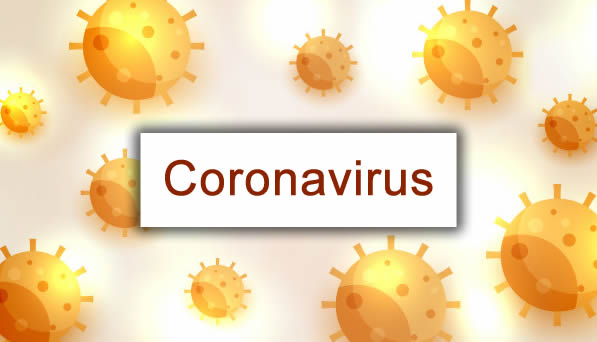
As you are aware, there has been a great deal of attention in the news regarding the coronavirus, a flu-like disease that was originally identified in December. The virus has spread from China throughout the world, and is currently being monitored daily by the Centers for Disease Control (CDC).
In an effort to further protect our patients and staff, we ask that you all are mindful of the following precautions:
🤧 If you are sick, please stay home. Please call to cancel your appointment and we will surely reschedule when you are feeling better.
😳 If you are sick and have a dental emergency – please call us so we can help you manage the situation at home or we will help to figure out an alternative solution.
🗣 Please let us know if you have any special circumstances that we should be aware of, such as recent travel abroad to areas afflicted by the virus.
Thank you for your trust in this area. We look forward to many happy smiles in the future!
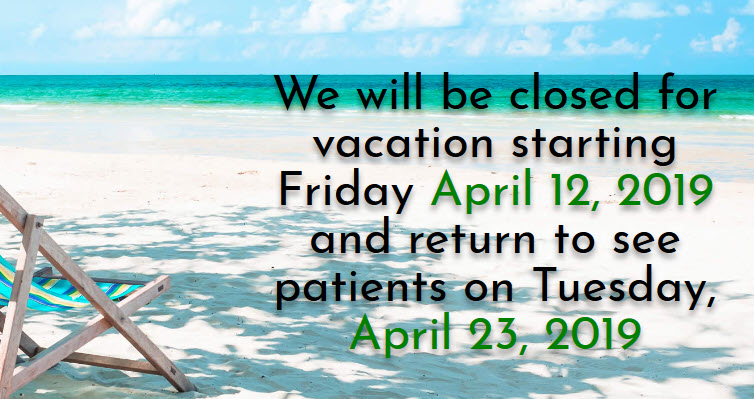
We will be closed for vacation starting Friday April 12, 2019 and return to see patients on Tuesday, April 23,2019












